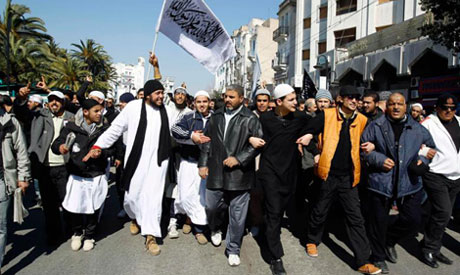
Islamist protesters wave flags and shout "Allahu Akbar" (God is Greatest) during a demonstration in Tunis 2 March, (Photo: Reuters).
Tunisia's Islamist-led government has granted a license to a political party based on puritanical Salafi Islam for the first time in one of the most secular Arab nations, the party founder and a government source said on Friday.
While Islamists did not play a prominent role in the 2011 uprising that toppled secular dictator Zine al-Abidine Ben Ali, a struggle over the role of religion in government has since polarised politics in the North African state.
Banned under Ben Ali, who severely repressed Islamists, the moderate Islamist Ennahda party won 42 percent of seats in Tunisia's first free election in October and now leads the government.
But ultra-conservative Salafi Islamist groups, who have pushed for the creation of an Islamic state and the imposition of Sharia, or Islamic law, did not take part in that ballot.
The newly-licensed Islah (Reform) Front will be eligible to take part in parliamentary elections due next year.
Mohammed Khoja, the head of the Reform Front told Reuters his Salafists respected democracy and the civil nature of the state. "There are some religious currents that say politics is dirty and does not agree with religion," he said by telephone.
"We say this is not true and we do not agree with them and we say Islam is a religion of freedom and democracy."
A government source confirmed that the license had been granted in accordance with the parties law, which stipulates respect for the civil nature of the Tunisian state.
Salafis follow a strict interpretation of Islam and seek to emulate the sayings and doings of the earliest Muslims more than 1,000 years ago.
Until last year, they had tended not seek a role in parliamentary politics, which many denounced as a Western import. But they have begun to shift their position in the aftermath of the Arab Spring uprisings.
In Egypt, where protests unseated Hosni Mubarak in February 2011, Salafis have since played an active role, winning over a quarter of parliament seats and making a bid for the presidency.
In Tunisia, analysts say the rise of Ennahda, which is ruling in coalition with two secular parties, has persuaded some Islamist groups to revise their stance and enter politics.
Ennahda's co-founder and leader, Rached al-Ghannouchi, had said previously that Salafi parties should be licensed as long as they embrace democracy, offering them a stake in the new system rather than locking them out as Ben Ali had done.
Ennahda has promised not to impose the veil or ban alcohol has many secularists had initially feared.
But secular Tunisians worry that more conservative Salafis will seek to impose their views, raising pressure on women to cover up or restaurants to stop serving wine, transforming the Mediterranean tourist destination into a religious state.
The Reform Front is expected to encourage observance of Islamic values, but by democratic means.
"We will not impose anything like clothing or anything else. Our party will be open to all Tunisians who agree with our principles, the principles of reform within the Islamic heritage," said Khoja, whose party, like Ennahda, includes several members who were jailed under Ben Ali.
"But we will not accept any assault on our religious sacraments and we will seek to express the demands of the Muslim people."
The new Salafi party has not yet spelled out what its election platform will be but is expected to woo voters to the right of Ennahda who are not currently represented.
Short link: